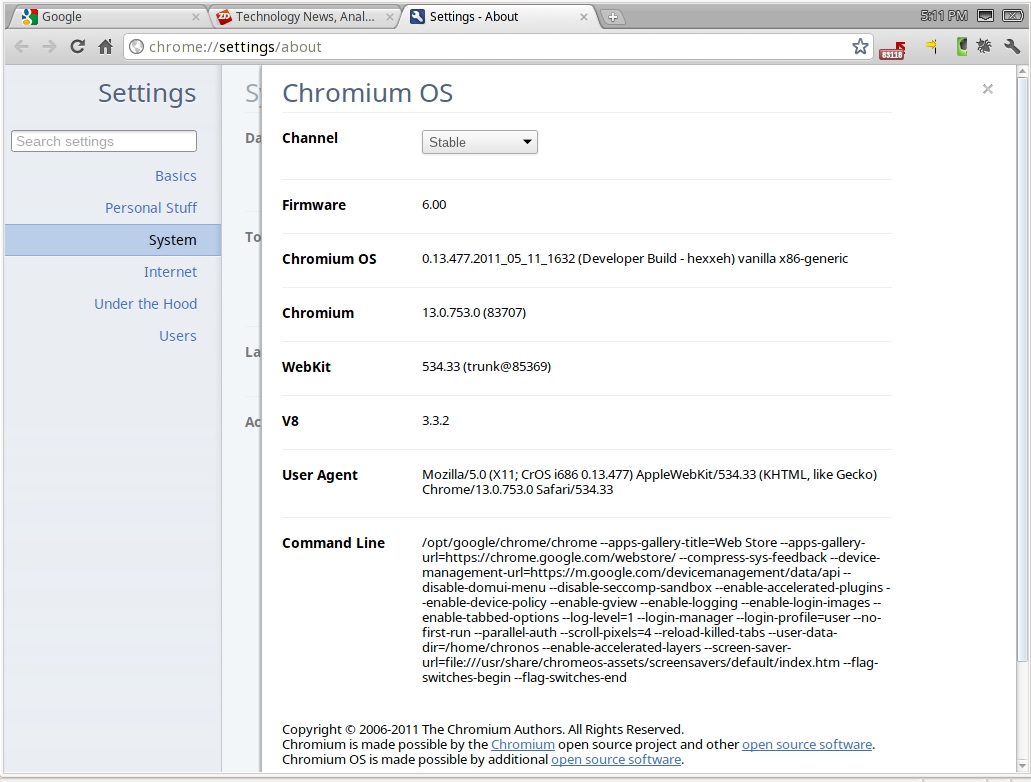Chrome OS? Sign me up. ChromeBook? Not so much.

Why pay a premium for Google's Chrome OS on a $350 or $430 notebook if you can install it yourself?
Today, at the Google IO conference in San Francisco, Google announced the pending avaliablity of the first commercial offerings based on Chrome OS, a pair of notebook computers by Samsung and Acer.
Now, I've been playing with Chrome OS for quite a few months, ever since I brought a colleague's loaner CR-48 on Christmas vacationas my primary computerand after Google sent me a device to permanently play with. I like Chrome OS. A lot.
Also Read: A Very Chrome-y Christmas
There's just one problem with it: I don't really want to have to pay Acer or Samsung $350.00-$430 for about $200.00-$250.00 worth of hardware for the privilege of running it. And even if I were a student, I certainly don't want to pay a $20 monthly rental on hardware that would amortize itself in less than a year.
You'd have to be out of your mind to keep it any longer than that. No, scratch that, you'd be out of your mind to agree to do it in the first place.
Read my colleague Ed Bott's analysis, I think he's dead on. Google and its partners are crazy to sell the device that high, given the limited functionality of the product.
I mean heck, I could go out right now and buy a refurb Asus Eee PC from TigerDirect with roughly the same hardware specs and spend $250.00. Or if I wanted another Acer, I could get a full-blown AMD dual-core laptop for the same $350 as their ChromeBook.
It was thought that during the CR-48's launch that these Intel Atom-based Chrome notebooks would eventually go for about $250.00-$300.00 or so, less than what an entry-level notebook computer should cost because it's missing a hard disk and only needs about 1GB of RAM, with a low-range integrated Intel GPU.
Heck, the thing is basically just a web browser sitting on top of a kernel. It doesn't need a full-blown notebook's worth of hardware. The BOM on the thing just shouldn't be this high to justify what they are charging.
The way I see it, these initial product offerings are at least $100.00 overpriced.
But never mind the cost, for a moment. There's also the issue of flexibility.
If I want to run the official Google version of Chrome OS, I have to buy one of these new notebooks. Well, hypothetically, what if I don't want to run it on a notebook? What if my vision is impaired, and I want to use it on a much larger screen?
Say on an entry-level desktop PC? Or on a older computer I'd like to give to my children, or my father-in-law? Or if I was a cash-strapped educator in a third-world country or an inner-city school and I wanted to get an entire classroom on the Internet, cheaply?
You can't. Because while Google has opened the source code for Chrome OS, there's no official Google "distribution", like an Ubuntu, which you can just grab and toss on any old computer.
Indeed, there are hard-working rogue programmers out there, like as Liam Mcloughlin, aka "Hexxeh" who is diligently making nightly builds of Chromium OSand is providing VM images and even a USB stick that allows you to install the software on a certain subset of notebook and PC hardware.
But at best this is a resourceful and very smart college kid that is doing this as a best-effort. It's not a well-funded project like Ubuntu or even something like MeeGo or most similarly, Jolicloud OS (which is one of the coolest micro-distros I've played with lately)
If Google really wants people to be able to get a taste of what Chrome OS can do, then it has to do more than throw the Chromium OS source code out on a public CVS tree and say "good luck."
Google needs to fund it as a full-blown Linux distribution that anyone can install, on any hardware that a typical distribution would support, which would also include hardware-accelerated virtual machines.
Not only would this spread the platform out to all sorts of developers and potential systems integrators that can expand the ecosystem for this new OS, but it's just plain smart because it's viral marketing.
Sure, I think it's great we can buy Chrome OS pre-loaded on hardware. Some people will undoubtedly pay for the premium. But for crying out loud, don't make it the only way for non-developers to get access to this OS.
Should Google make Chrome OS into a "distribution" like Ubuntu or MeeGo? Talk Back and Let Me Know.
